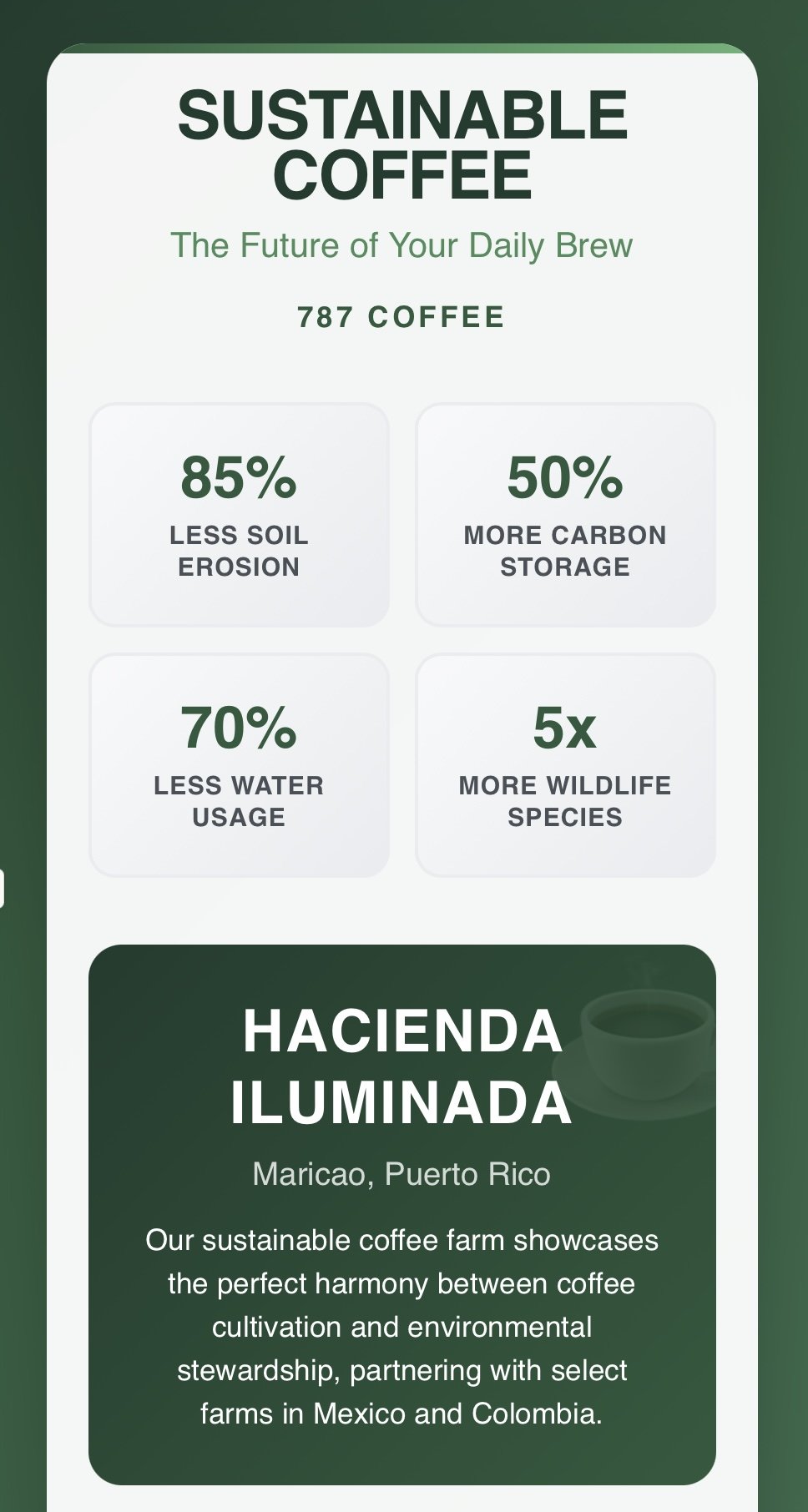The Ultimate Guide to Sustainable Coffee: Why Eco-Friendly Coffee is the Future of Your Daily Brew
Let’s Connect on Social
Discover how sustainable coffee practices are revolutionizing the industry while delivering the best organic coffee experience to your cup 💛
What Makes Coffee Truly Sustainable? The Complete Guide
In today's environmentally conscious world, sustainable coffee has become more than just a trend—it's a necessity. As coffee lovers increasingly seek the best organic coffee options, understanding what makes coffee truly eco-friendly can transform both your daily ritual and our planet's future.
Sustainable coffee refers to coffee grown, processed, and traded in ways that protect the environment, support farming communities, and ensure long-term viability of coffee production. This comprehensive approach encompasses everything from soil health to fair trade practices, creating a coffee experience that's as good for the earth as it is for your taste buds.
How Sustainable Coffee is Grown: Revolutionary Farming Practices
Shade-Grown Coffee: Nature's Perfect System
The best sustainable coffee comes from farms that work with nature, not against it. Traditional shade-grown coffee methods create biodiverse ecosystems where coffee plants thrive under natural canopy cover. This approach:
Preserves natural bird habitats (supporting over 150 species per farm)
Reduces soil erosion by 85% compared to sun-grown alternatives
Maintains natural pest control through ecosystem balance
Requires 50% less water than conventional methods
Organic Farming: Pure Coffee, Pure Conscience
Best organic coffee farms eliminate synthetic pesticides and fertilizers, relying instead on natural composting and biological pest control. These practices result in:
Healthier soil microbiomes that sequester 30% more carbon
Zero chemical runoff into local water systems
Coffee beans with higher antioxidant levels
Reduced farmer exposure to harmful chemicals
Water Conservation: Every Drop Counts
Sustainable coffee farms implement innovative water management systems that:
Reduce water usage by up to 70% through efficient processing methods
Implement rainwater harvesting systems
Use natural fermentation processes that eliminate chemical washing
Protect local watersheds from contamination
Environmental Benefits: How Your Coffee Choice Saves the Planet
Carbon Footprint Reduction
Choosing sustainable coffee makes a measurable environmental impact:
Carbon Sequestration: Shade-grown coffee farms store 50% more carbon than conventional plantations
Reduced Transportation Emissions: Direct trade relationships minimize shipping distances
Lower Processing Energy: Traditional methods require 40% less energy than industrial processing
Biodiversity Protection: Sustainable farms support 5x more wildlife species than conventional operations
Deforestation Prevention
The coffee industry has historically contributed to deforestation, but sustainable practices are reversing this trend:
Agroforestry systems actually increase forest cover by 25-40%
Shade-grown coffee eliminates the need for forest clearing
Sustainable farms serve as wildlife corridors connecting forest fragments
Every pound of sustainable coffee purchased supports 2.5 square feet of forest preservation
Water System Protection
Eco-friendly coffee farming protects one of our most precious resources:
Natural processing methods eliminate 95% of water pollution typically associated with coffee production
Sustainable farms implement buffer zones protecting rivers and streams
Reduced chemical usage prevents groundwater contamination
Water recycling systems minimize overall consumption
Health Benefits for Coffee Lovers: Why Sustainable Coffee Tastes Better and Feels Better
Superior Nutritional Profile
Best organic coffee offers enhanced health benefits through natural growing methods:
Higher Antioxidant Levels: Organic coffee contains 12% more chlorogenic acids
No Chemical Residues: Zero pesticide or herbicide traces in your cup
Enhanced Flavor Compounds: Slower growth produces more complex flavor profiles
Natural Processing: Preserves beneficial compounds often destroyed in industrial methods
Reduced Health Risks
Choosing sustainable coffee eliminates exposure to:
Glyphosate and other herbicides linked to health concerns
Synthetic fertilizer residues
Chemical processing agents
Artificial flavor enhancers and preservatives
Better Digestion and Energy
Many coffee enthusiasts report that sustainable coffee provides:
Smoother energy curves without jitters
Better digestive tolerance
Enhanced mental clarity
Longer-lasting energy without crashes
Economic Impact: Supporting Communities Through Coffee Choice
Fair Trade Benefits
Sustainable coffee practices ensure farmers receive fair compensation:
Premium prices that are 20-40% higher than commodity rates
Long-term contracts providing financial security
Investment in community infrastructure and education
Women's empowerment programs in coffee-growing regions
Local Economy Support
When you choose sustainable coffee, you're supporting:
Small-scale family farms over industrial plantations
Traditional farming knowledge and techniques
Rural community development
Cooperative business models that strengthen local economies
Finding the Best Sustainable Coffee: What to Look For
Certifications That Matter
Look for these trusted certifications when selecting best organic coffee:
USDA Organic: Ensures no synthetic chemicals
Fair Trade Certified: Guarantees fair farmer compensation
Rainforest Alliance: Focuses on environmental and social standards
Bird Friendly: Specific shade-grown requirements
Direct Trade: Transparent farmer relationships
Quality Indicators
The best sustainable coffee exhibits these characteristics:
Traceability: Clear information about farm origin and processing methods
Freshness: Recently roasted dates and proper packaging
Flavor Complexity: Rich, nuanced taste profiles from careful cultivation
Seasonal Availability: Recognition of natural harvest cycles
The Future of Coffee: Sustainability as Standard Practice
Climate Change Adaptation
Sustainable coffee farms are leading climate resilience efforts:
Developing drought-resistant coffee varieties
Implementing carbon-neutral processing methods
Creating climate adaptation strategies for farming communities
Investing in renewable energy systems
Technology Integration
Modern sustainable coffee operations incorporate:
Precision agriculture techniques reducing resource waste
Solar-powered processing equipment
Digital platforms connecting farmers directly with roasters
Blockchain technology ensuring supply chain transparency
Consumer Demand Driving Change
The shift toward sustainable coffee is accelerating:
73% of global consumers willing to pay more for sustainable products
Specialty coffee market growing 8% annually
Major coffee chains committing to 100% sustainable sourcing
Younger generations prioritizing environmental impact in purchasing decisions
Be a CAFFEINATED HUMAN.
Be a creative human. Be a good human.
Making the Switch: Your Path to Better Coffee
A Real-World Example: Hacienda Iluminada and Beyond
At Hacienda Iluminada in Maricao, Puerto Rico, sustainable coffee farming isn't just a concept—it's a living reality. This exemplary coffee farm demonstrates how traditional methods combined with modern sustainability practices create exceptional organic coffee while protecting Puerto Rico's unique mountain ecosystem.
Nestled in the lush mountains of Maricao, Hacienda Iluminada showcases the perfect harmony between coffee cultivation and environmental stewardship. The farm's commitment to shade-grown methods preserves the natural rainforest canopy, supporting local wildlife while producing coffee beans with distinctive flavor profiles that reflect Puerto Rico's rich terroir.
While the majority of premium sustainable coffee comes directly from Hacienda Iluminada, the commitment to environmental excellence extends across borders through carefully selected partnerships with like-minded coffee farms in Mexico and Colombia. These collaborative relationships ensure that every coffee offering meets the same rigorous standards for sustainability, quality, and environmental responsibility—creating a diverse portfolio of exceptional coffees united by shared values.
Taste the Difference
Sustainable coffee offers superior flavor through:
Complex Flavor Profiles: Slower growth develops nuanced tastes
Terroir Expression: Environmental factors create unique characteristics from Puerto Rico's mountains to Colombia's highlands and Mexico's volcanic regions
Artisanal Processing: Traditional methods enhance natural flavors
Freshness Focus: Direct relationships ensure peak quality delivery
Calculate Your Impact
By switching to sustainable coffee, a typical coffee drinker:
Prevents 2.5 pounds of chemical pesticides from entering the environment annually
Supports preservation of 25 square feet of biodiverse habitat
Contributes to fair wages for farming families
Reduces personal carbon footprint by 15% in beverage consumption
Where to Find the Best Sustainable Coffee
Look for coffee shops and roasters that prioritize:
Transparency: Clear information about sourcing and practices
Relationships: Direct partnerships with sustainable farms like Hacienda Iluminada and carefully selected farms across Mexico and Colombia
Education: Staff knowledge about sustainability practices
Community: Support for local and global coffee communities
Aligned Values: Collaboration only with coffee farms that share environmental commitments across multiple regions
The most authentic sustainable coffee experiences come from businesses that maintain direct relationships with their primary farms while expanding their offerings through strategic partnerships with farms in renowned coffee-growing regions like Mexico and Colombia—all united by shared commitment to environmental stewardship and ethical practices.
Conclusion: Every Cup Makes a Difference
Choosing sustainable coffee represents more than a beverage preference—it's a vote for environmental protection, social justice, and superior quality. As coffee lovers, we have the power to drive positive change through our daily choices.
The best organic coffee doesn't just taste better; it creates a better world. From protecting biodiversity to supporting farming communities like those at Hacienda Iluminada in Puerto Rico's mountains, from reducing carbon footprints to enhancing personal health, sustainable coffee offers benefits that extend far beyond your morning cup.
When coffee companies collaborate exclusively with farms and suppliers that align with environmental values and earth-conscious practices, they create a supply chain built on integrity. This commitment to working only with like-minded partners ensures that every aspect of your coffee journey—from seed to cup—reflects genuine care for our planet.
Ready to make the switch to sustainable coffee? Your taste buds, your health, and our planet will thank you for choosing quality, ethics, and environmental responsibility in every sip.
Ready to experience the difference sustainable coffee makes? Visit your local specialty coffee shop or explore online retailers committed to eco-friendly practices. Together, we can create a more sustainable future, one cup at a time.
















